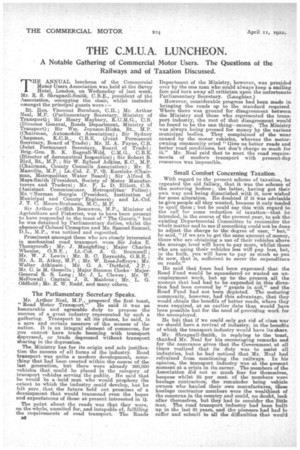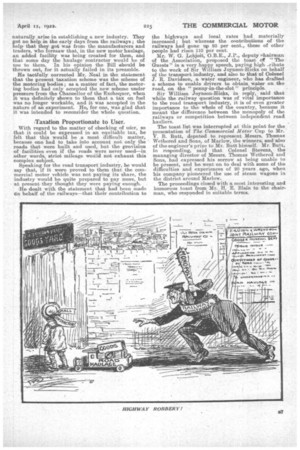THE C.M.U.A. LUNCHEON.
Page 10

Page 11

If you've noticed an error in this article please click here to report it so we can fix it.
A Notable Gathering of Commercial Motor Users. The Questions of the Railways and of Taxation Discussed.
THE ANNUAL luncheon of the Commercial Motor Users Association was held at the Savoy Hotel, London, on Wednesday of last week, Mr. E. S. Shrapne11-Smith, C.B.E., president of the Association, occupying the chair, whilst included amongst the principal guests were :— Rt. Bon. Viscount Burnham, 0.11.; Mr. Arthur Neal, M.P. (Parliamentary Secretary, Ministry of Transport); Sir Henry Ma.ylaury, K.C.M.G., C.B. (Director General, Roads Department, Ministry of Transport); Sir Wm. Joynson-Ilieks, Bt., M.P. (Chairman, Automobile Association); Sir Sydney Chapman, K.C.B., C.B.E. (Joint Permanent Secretary, Board of Trade); Mr. H. A. Payne, C.B. (Joint Permanent Secretary, Board of Trade) ; Brig.-Gen. R. K. Bagnall-Wild, C.M.G., C.B.E. (Director of Aeronautical Inspection); Sir Robert B. Bird, Bt., M.P.; Sir W. Ryland Adkins, LO., M.P. (Chairman, County Councils Association); Mr. E. Manville, LP.; Lt. CoI. J. P. tB. Kerslake (Chairman, Metropolitan Water Board); Sir Alfred S. Mays-Smith (President, Society of Motor Mantifa,eturers and Traders) ; Mr. F. L. D. Elliott., C.B. Assistant Commissioner, Metropolitan' Police); Mr. e. Norman Scorgie (President, Institution of Municipal and County' Engineers); and Lt.-Col. J. T. C. Moore-Brabazon, M.C., M.P.
Sir Arthur Griffith Boscaiven, M.P., Minister of Agriculture and Fisheries, was to have been present to have responded to the toast of "The Guests," but he was detained by Parliamentary duties, whilst the absence of Colonel Crompton and Mr. Samuel Samuel, D.L., M.P., was noticed and regretted.
Prominent amongst those who are closely interested in mechanical road transport were Sir John E. Thornycroft; Mr. J. Maughffing ; Major Charles Wheeler, 0.B.E. ; Lt.-Col. A. G. Scammell ; Mr. W. J. Lewin ; Mr. R. C. Reynolds, 0.B.E. ; Mr. A. R. Atkey, M.P.; Mr. W. Rees-Jeffreys; Mr. Walter Atkinson; Mr. G. A. 'Duffield, J.P. ; Mr. C. le M. Gosselin ; Major &Jenson Cooke MajorGeneral S. S. Long ; Mr. J. L. Clewes ; Mr. W. McDowell; Captain J. R. Maidens ; Mr. L. G. Oldfield ; Mr. E. W. Rudd, and many others.
The Parliamentary Secretary Speaks.
Mr. Arthur Neal, M.P., proposed the first toast, "Road Motor Transport." He said it was an honourable and agreeable duty to propose the success of a great industry represented by such a gathering. Transport in all it phases, he said, is a sure and certain measure of the success of the nation. It is an integral element of commerce, for you cannot have trade booming with transport depressed, or trade depressed without transport sharing in the depression.
The Ministry has for its origin and sole justification the success of all forms of the industry. Road transport was quite a modern development, something that had been created within the course of the last generation, but there were already 300,000 vehicles that eouId be placed in the category of transport vehicles serving the public. He said that he, would be a •bold man who would prophesy the extent to which the industry could develop, but he felt sure, that the future held out promises of a development that would transcend even the hopes and expectations of those at present interested in it.
The point about the roads was that they were, on the whole, unsuited for, and incapable of, fulfilling the requirements of road transport. The Roads Be Department of the Ministry, however, was presided over by the one man who could always keep a smiling face and turn away all criticism upon the unfortunate Parliamentary Secretary. (Laughter.) However, considerable progress had been made in bringing the roads up to the standard required. Where there was ground for disagreement between the Ministry and those who represented the transport industry, the root of that disagreement would be found to be the one thing—money. The Ministry was always being pressed for money by the various municipal bodies. They complained of the wear caused by the motor vehicles, whereas the motorowning community cried "Give us better roads and better road conditions, but don't charge so much for it." Mr. Neal said that to meet the road requirements of modern transport with present-day resources was impossible.
Small Comfort Concerning Taxation.
With regard to the present scheme of taxation, he repeated the old fallacy, that it was the scheme of the motoring bathes' the latter, having got their own way and being dissatisfied with it, now wished for some alteration. He doubted if it was advisable to give people all they wanted, because it only tended to spoil them ; but he could say this with regard to the call for some reduction of taxation—that he intended, in the course of the present year, to ask the existing Departmental Committee to reconsider the whole matter and to see if something could not be done to adjust the charge to the degree of user, " but," he said, "if we are to get the same amount of money, those who are obtaining a use of their vehicles above the average level will have to pay more, whilst those who are using their vehicles less will pay less, but, in the bulk, you will have to pay as much as you do now, that is, sufficient to cover the expenditure on roads."
He said that fears had been expressed that the Road Fund would be squandered or wasted on unemployment work, but up to the present all the moneys that had bad to be expended in this direction had been covered by "grants in aid," and the Road Fund had not been depleted. The motoring community, however, had this advantage, that they would obtain the benefits of better roads, where they were required, at an earlier date than would have been possible but for the need of providing work for the unemployed.
Ile felt that if we could only get rid of class war we should have a revival of industry, in the benefits of which the transport industry would have its share.
Mr. Shrapnell-Smith, in replying to the toast, thanked Mr. Neal for his encouraging remarks and for the assurance given that the Government at all times realized that its duty was to assist all industries, but he had noticed that Mr. Neal had refrained from mentioning the railways. In Ms opinion' the transport industry was at the present moment at a crisis in its career. The members of the Association did not so much fear for themselves, because whilst 25. per oent, of the members were haulage contractors' the remainder being vehicle owners who hauled their own manufactures those haulage contractor members were the wealthiest of the concerns in the country and could, no doubt, look after themselves, but they had to consider the little man. The road transport industry had been built up in the last 25 years, and the pioneers had had to suffer and submit to all the difficulties that would naturally arise in establishing a new industry. They got no help in the early clays from the railways ; the help that they got was from the manufacturers and traders, who foresaw that, in the new motor haulage, an added facility was being created for them, and that some day the haulage contractor would be of use to them. In his opinion the Bill ehould be thrown out, for it actually failed in its preamble.
He tactfully corrected Mr. Neal in the statement that the present taxation scheme was the scheme of the motoring bodies; as a matter of fact, the motoring bodies had only accepted the new scheme under pressure from the Chancellor of the Exchequer, when it was definitely shown to them that a tax on fuel was no longer workable, and it was accepted in the nature of an experiment. He, for one, was glad that it was intended to reconsider the whole question.
.Taxation Proportionate to User.
With regard to the matter of checking of tiger, so that it could be expressed in an equitable tax, he felt that this would be a most difficult matter, because one had to take into account not only the that were built and used, but the provision of facilities even if the roads were never used—in other words, strict mileage would not exhaust this complex subject.
Speaking for the road transport industry, he would say that, if it were proved to them that the commercial motor vehicle was not paying its share, the industry would be quite prepared to pay more but at present they thought they were paying enough. .
,He dealt with the statementbad been made ein behalf of the railways—thattheir contribution to the highways and local rates had materially increased; but whereas the contributions of the railways had gone up 95 per cent., those of other people had risen 110 per cent.
Mr. W. G. Lobjoit, 0.B.E., J.P., deputy (+airman of the Association, proposed the toast of " The Guests " in a very happy speech, paying high ..ribute to the work of Sir William Joynson-Hicks on behalf of the transport industry, and also to that of Oolonel J. B. Davidson, a water engineer, who has drafted a scheme to enable drivers to obtain water on the road, on the "penny-in-the-slot" principle.
Sir William Joynson-Hicks, in reply, said that while the railway question Was of vital importance to the road transport industry, it is of even greater importance to the whole of the country, because it meant the difference between the monopoly of the railways or competition between independent road hauliers.
The toast list was interrupted at this point for the presentation of The Commercial Motor Cup to Mr. V. B. Butt, deputed to represent Messrs. Thomas Wethered and Sons, of Marlow, the winners, andetlso of the engineer's prize to Mr. Butt himself. Mr. Butt, in responding, said that Colonel Stevens, the managing director of Messrs. Thomas Wetberei and Sons, had expressed his sorrow at being unable to be present, and he went on to deal with some of the difficulties and experiences of 20 years ago, when his company pioneered the use of steam wagons in the district around Marlow.
The proceedings closed with a most interesting and humorous toast from Mr. H. E. Blain to the chairman, who responded in suitable terms.
































